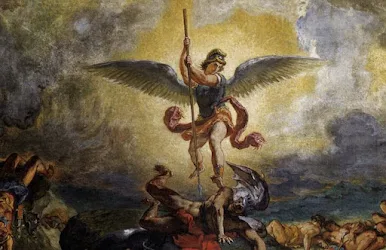
Chères sœurs et chers frères, que la paix et l’amour du Christ Jésus soient avec vous !
Aujourd’hui,
nous méditons sur l’histoire de la chute d’Adam et Ève, l’un des moments les
plus déterminants de l’histoire du salut, marquant la rupture de la communion
entre Dieu et l’humanité. Ce passage raconte les conséquences tragiques de la
désobéissance d’Adam et Ève, mais, au cœur de cette tristesse, il révèle aussi
l’amour inébranlable de Dieu et son plan de rédemption. Approfondissons ce
texte en nous appuyant sur la richesse de la langue hébraïque pour en dévoiler
toute la profondeur.
«Où
es-tu?» (Ayekah ?) : Le cri d’un Dieu en quête de l’homme
Lorsque
Adam et Ève mangent du fruit défendu, leur premier réflexe est de se cacher.
Ils prennent conscience de leur nudité, symbole de leur vulnérabilité, de leur
culpabilité et de leur séparation d’avec Dieu. Mais remarquons bien les
premiers mots que Dieu prononce après leur chute :
« Où es-tu ? » (Genèse 3,9)
Le
mot hébreu Ayekah n’est pas simplement une question de localisation ;
c’est un cri relationnel. Dieu ne cherche pas une information ; Il sait déjà où se trouve Adam. Il appelle un
cœur égaré, une âme qui s’est éloignée de Lui. Ce n’est pas la voix d’un juge
en colère, mais celle d’un Père aimant qui pleure la communion brisée. Ce cri
retentit encore aujourd’hui dans chaque cœur humain. Dieu continue de nous
poser la question :
« Où es-tu ? Où en est ton âme par rapport à Moi ? »
Encore
aujourd’hui, lorsque nous péchons, nous avons tendance à nous cacher derrière
des excuses, des distractions et même une autosatisfaction trompeuse. Mais Dieu
ne renonce pas à nous. Son appel est une invitation à revenir à Lui.
« La femme que Tu as mise auprès de moi… » . Le jeu des
reproches et la fracture de l’unité
La
réponse d’Adam à la question de Dieu est assez frappante : « La femme que Tu
as mise auprès de moi m’a donné du fruit de l’arbre, et j’en ai mangé. » (Genèse
3,12)
Ici,
Adam ne se contente pas d’accuser Ève ; il blâme subtilement Dieu lui-même : «
La femme que TU as mise auprès de moi… » En hébreu, le mot pour femme (Ishah)
est le même que celui qu’Adam avait employé avec joie dans Genèse 2,23
en voyant Ève pour la première fois :
«
Cette fois, c’est l’os de mes os et la chair de ma chair ! »
Mais
dans ce récit son langage a changé. Au lieu de la chérir, il prend ses
distances avec elle. Le péché ne rompt pas seulement notre relation avec Dieu ;
il brise aussi les relations humaines, en particulier entre l’homme et la
femme.
Ne
voyons-nous pas ce même schéma dans nos relations aujourd’hui? Nous nous
rejetons mutuellement la faute, nous cherchons à justifier nos propres actions
et nous refusons d’assumer nos responsabilités. L’harmonie voulue par Dieu
entre l’homme et la femme, fondée sur l’amour et la confiance mutuels, s’est
transformée en compétition, en méfiance et en rupture.
« Ton désir te portera vers ton mari, et lui dominera sur
toi » (Ve’el ishech teshukatech) : La lutte pour le pouvoir
Dieu
annonce ensuite à Ève les conséquences du péché : « Ton désir te portera vers
ton mari, et lui dominera sur toi. » (Genèse 3,16).
Le
mot hébreu teshukah signifie bien plus qu’un simple « désir ». Il
exprime un élan intense, parfois même une volonté de domination (Genèse 4,7
emploie le même mot pour désigner le péché qui cherche à maîtriser Caïn). Cela
signifie qu’après la chute, la relation entre l’homme et la femme sera marquée
par la lutte plutôt que par l’harmonie. Au lieu d’un partenariat d’amour, il y
aura désormais une bataille pour le pouvoir.
N’est-ce
pas ce que nous constatons aujourd’hui ? La rivalité entre les sexes, les abus,
les incompréhensions… Tout cela trouve ses racines dans ce moment originel. Le
péché pervertit l’ordre naturel, transformant la complémentarité voulue par
Dieu en conflit.
Mais ce n’est pas le dessein originel
de Dieu. Il ne veut pas l’oppression mais la restauration, un retour à l’amour
mutuel, au respect et à l’unité que le Christ vient rétablir.
« À la sueur de ton visage… jusqu’à ce que tu retournes à
la terre » . Le fardeau d’un monde brisé
Dieu
dit à Adam : « À la sueur de ton visage, tu mangeras ton pain, jusqu’à
ce que tu retournes à la terre, d’où tu as été pris ; car tu es poussière, et
tu retourneras à la poussière. » (Genèse 3,19)
Le
mot hébreu pour terre (Adamah) est la racine même du nom Adam.
Il a été tiré de la terre, et maintenant, à cause du péché, il luttera contre
elle. Le travail, qui était initialement une participation joyeuse à l’œuvre
divine, devient un fardeau. La mort entre dans le monde. L’homme est rappelé
à sa fragilité : sans Dieu, il n’est que poussière.
Voyons-nous cela dans notre propre vie
? Le travail épuisant, la souffrance, la mort inévitable… Ce n’était pas ainsi
que les choses devaient être. Et pourtant, Dieu ne nous laisse pas sans espoir.
« Le Seigneur Dieu fit à Adam et à sa femme des tuniques
de peau et les en revêtit » : Un signe de miséricorde
Malgré leur péché, Dieu accomplit un
geste inattendu :
«
Le Seigneur Dieu fit à Adam et à sa femme des tuniques de peau et les en
revêtit. » (Genèse 3,21)
Cet
acte est profondément symbolique. Le mot peau (or ) suggère un
sacrifice, peut-être la première mort de
l’histoire. Du sang a été versé pour couvrir leur nudité. Cela préfigure le
Christ, l’Agneau de Dieu, dont le sang couvrira un jour entièrement notre
péché. Même dans le jugement, la miséricorde divine brille.
Ce que ce passage révèle sur l’homme et la femme
aujourd’hui : Genèse
3,9-24 résonne encore dans notre monde : Dieu
nous appelle toujours à revenir à Lui. Peu importe combien nous sommes
tombés, Il continue de demander : « Où es-tu ? ». Le péché a
fracturé la relation entre l’homme et la femme. Au lieu de
l’unité, nous voyons souvent le blâme, le contrôle et la lutte. Mais le Christ
restaure ce qui a été perdu en Éden. La souffrance est réelle,
mais la grâce l’est aussi. Le travail, les relations et même la mort
portent les cicatrices du péché, mais la miséricorde de Dieu nous offre la
rédemption. L’amour implique le sacrifice. Les premiers
vêtements sont venus du sacrifice d’un animal, annonçant le sacrifice ultime de
Jésus, qui nous revêt de Sa justice.
«Où es-tu?» : La question la plus urgente
aujourd’hui.
Où
en sommes-nous dans notre relation avec Dieu? Avec notre conjoint, nos amis,
notre communauté? Sommes-nous encore cachés, à blâmer les autres ou à vivre
dans la brisure du péché? Ou acceptons-nous la grâce offerte par le Christ, le
Nouvel Adam, qui restaure tout ?
Ne
restons pas cachés, mais marchons à nouveau dans la lumière de l’amour de Dieu.
Amen.
Prions le
Seigneur
Seigneur, restaure notre communion avec Toi
Seigneur Tout-Puissant et miséricordieux,
Dans notre faiblesse, nous avons souvent
fui Ton regard,
Nous nous sommes cachés derrière nos peurs,
nos fautes et nos excuses.
Mais aujourd’hui, nous entendons Ton appel : « Où es-tu ? »
Et nous voulons revenir à Toi.
Père d’amour,
Tu ne nous as pas abandonnés à notre chute,
Mais Tu as couvert notre nudité par Ton
amour,
Préparant dès le commencement le chemin de
notre salut.
Merci pour la lumière du Christ, le Nouvel
Adam,
Qui restaure ce que le péché a brisé.
Seigneur, guéris nos relations blessées,
Répands Ton Esprit d’unité et de paix dans
nos cœurs.
Que l’homme et la femme ne vivent plus dans
la rivalité,
Mais dans l’amour et la complémentarité
voulus par Toi.
Restaure notre communion avec Toi, ô Dieu
fidèle,
Redresse ceux qui sont tombés, relève ceux
qui doutent,
Et conduis-nous sur le chemin du retour
vers Toi,
Jusqu’à ce que nous entrions dans Ton
éternelle Jérusalem.
Amen.







